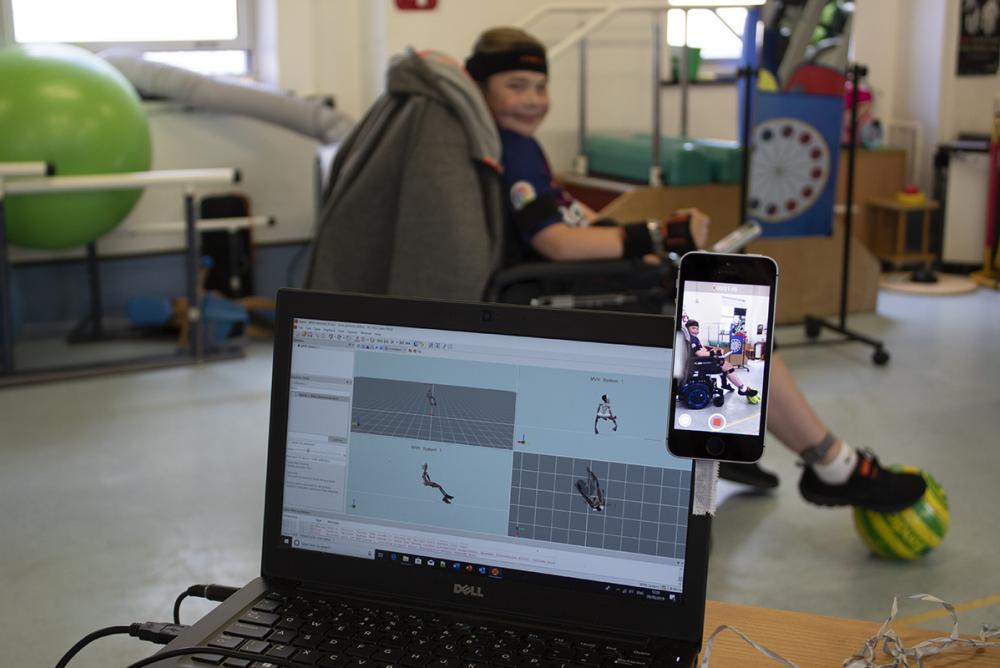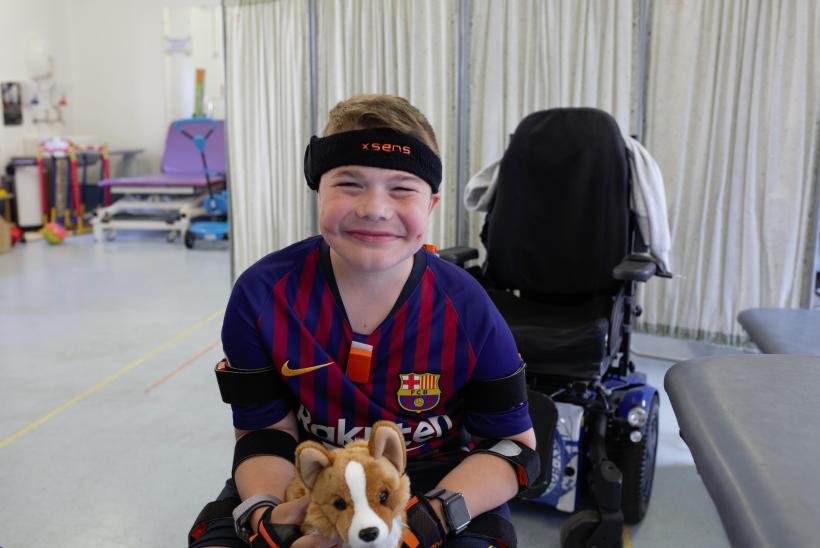Artificial intelligence helps children with rare condition
Artificial intelligence (AI) is increasingly being used to improve our everyday lives and at Great Ormond Street Hsopital we’re proud to be leading the way in applying this technology to healthcare research. Dr Valeria Ricotti shares how her team have been using AI to understand more about duchenne muscular dystrophy.
Duchenne muscular dystrophy (DMD) is a severe muscle-wasting disease, which mainly affects boys and usually causes them to become wheelchair bound by 12 years old. A team of GOSH researchers, clinicians and physiotherapists are currently pioneering an innovative research project, harnessing the power of AI to understand how movement ability declines in boys with DMD.
Dr Valeria Ricotti is lead clinical investigator on the project, working closely with physiotherapist Victoria Selby. Here Valeria shares how AI is being used to understand more about DMD.
AI bodysuits
In partnership with colleagues from Imperial College London, the team are tracking movement in boys with DMD using a special bodysuit equipped with 17 sensors. The data is then processed by Professor Aldo Faisal’s team at Imperial using advanced artificial intelligence and machine learning analytics. The result is a 360-degree view of the boys' activity.
“Boys who take part in the study wear the bodysuit for a day in the hospital with Victoria Selby who is the lead physiotherapist on the study. They then take home four sensors the size of a watch, to wear on their wrists and ankles, and measure movement in day-to-day life. They'll wear these for six months before coming back for a follow-up visit where we can see how their movement ability has changed,” Valeria explains."The data is much more powerful than the human eye could capture with any type of assessment. This technology is really useful for tracking movement in progressive diseases where the changes over time are relatively subtle. This is key for developing new therapies.
Several healthy volunteers are taking part in the research alongside boys with DMD. “We were slightly concerned we would have difficulty recruiting participants as the boys who take part won’t actually benefit directly,” Valeria says. “But we have had an amazing response. The boys have really enjoyed the experience and are happy to contribute their time to facilitate future clinical trials for the development of new therapies.”
How research helps
Many clinical trials for DMD test the effectiveness of new medicines by measuring how far patients can walk in six minutes, before and after treatment. However, that does mean that patients who are no longer able to walk cannot take part in the trials.
“The AI bodysuit means we could track movement in all boys with DMD, irrespective of whether they have the ability to walk,” Valeria says. “Potentially, we can see if treatments are working in much smaller groups of patients and how these therapies have impact on the boys’ daily activities through tracking via the wrist/ankle sensors. It could help with determining the correct dose for individual patients or help us work out when the next dose is needed. Ultimately, this could mean faster times to develop therapies for children who need them.”
What next?
"So far we have analysed the data collected on the boys’ first visit when they wore the trackers for a day at GOSH. Now DMD boys are starting to come back for their six-month follow up visit and we’ll be able to see how their condition has changed over time. Even subtle changes will be picked up by the trackers making the assessment of the disease progression much more accurate and personalized.
“In an era when AI is permeating our society it is fascinating to bring together AI and healthcare. They are often split into two different disciplines and we are excited to be bringing these worlds together on the frontline of medicine. This technology could potentially have a massive impact for patients with progressive conditions."
Gavriel
17-year-old Gavriel was diagnosed with DMD when he was four years old. “We noticed something wasn't quite right when he was about three and started waking up with severe leg cramps,” mum Kerry says.
Gav, a keen horse rider, is taking part in the AI bodysuit research along with his brother Joshua who doesn't have the condition and is involved as a healthy 'control'. Researchers will be able to compare movements in children with and without the condition to see how DMD affects the muscles and joints.
"We want to turn what potentially was a tragedy into an opportunity by knowing we are helping future generations with this research," Kerry says.
Dr Ricotti adds: "When I mentioned the trial, I knew the family would want to get involved, even if it won’t benefit Gav directly. His family are very supportive.”
James
Leicester-based football fan James (10), is also taking part in the AI bodysuit trial. He visited GOSH this summer with his mum Mazz and dad Darren.
"When we got a phone call asking if we wanted to be involved in the AI bodysuit trial at GOSH, we were keen take part as it could help James and other children in the future," Mazz explains. "Research like this is so important.
"Being part of the trial has been quite easy. We first came down to GOSH about a year ago to try the bodysuit. James wore the tracker bands all over his body. Then he played around in the gym and did exercise tests with Vic the physiotherapist while the bands track his movements. We then took four sensor watches home and he wears them every day on his arms and legs. We just take them off at night when he goes to bed and charge them up. We’ve come back for a follow-up visit. He was more physically able last time but, since then, his condition has progressed. The bodysuit monitors his movements so they'll be able to track that change."
The research was supported by the Duchenne Research Fund and the trial was underpinned by the NIHR GOSH BRC.



